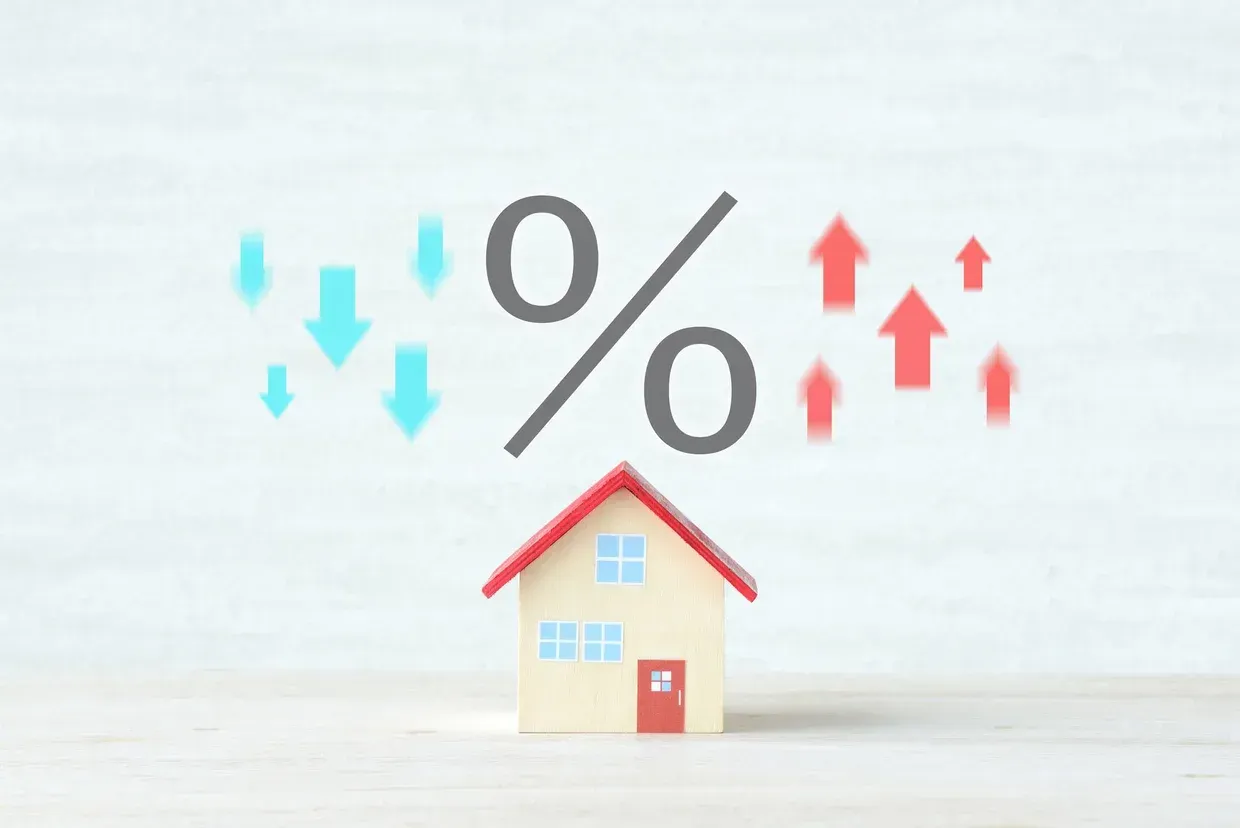YOUR TRUSTED
REAL ESTATE RESOURCE
We curate education on the latest and most common real estate topics for the buyers, sellers and real estate agents driving today’s millennial market.
EXPLORE the most recent
articles & vlogs

What's the mortgage interest rate forecast for March 2026? We may receive commissions from some links to products on this page. Promotions are subject to availability and retailer terms. By Matt Richardson February 25, 2026 / 10:53 AM EST / CBS News Mortgage rates have changed a lot in recent years. At one of their highest points, in October 2023, 30-year fixed rates climbed to 7.79%, which pushed millions of would-be buyers out of the market. Since then, a combination of six Federal Reserve rate cuts totaling 1.75%, cooling inflation and declining Treasury yields have slowly brought rates down. As of February 25, 2026, it's possible to secure a 30-year rate under 6% for qualified borrowers. With no Fed meeting in February, borrowers haven't had much to hang their hopes on. While the central bank doe not directly set mortgage interest rates, its policy decisions can have a broad influence on the overall market. The bank meets again on March 17 and 18, and experts generally expect the Federal Open Market Committee (FOMC) to hold interest rates at their current target range of 3.50% to 3.75%. So, how will these factors influence mortgage interest rates this month? And where could mortgage interest rates be headed as the year progresses? We asked some experts for their predictions. What's the mortgage interest rate forecast for March 2026? The experts we spoke to generally anticipate mortgage rates holding steady or dipping modestly in March. They anticipate the same factors that have been gradually pushing rates down continuing to do so. Those factors include a gradual decline in the 10-year Treasury yield and a fall in the Consumer Price Index (CPI) from 2.7% in December to 2.4% in January. Meanwhile, the Federal Reserve has been holding rates steady as they look for clearer economic signals. "I would expect that mortgage rates would stay pretty steady over March 2026," says Mark Schweitzer, associate professor of economics at Case Western Reserve University. "There is an FOMC meeting, but market expectations favor no change in the Fed funds rate. The most important data will be the upcoming CPI report on March 11." Andrew Postell, sales manager and VP of mortgage lending at Rate.com, notes that rates may not look like they're moving in the short term, but the cumulative shift over time has been significant. "Mortgage rates have been decreasing incrementally over the past two years or so. Week-to-week, it may not seem like a lot, but add it up over time, and the savings are substantial. We are nearly two points lower on the average interest rate from October 2023." The Fed meeting in March will surely draw plenty of attention, but Ralph DiBugnara, founder and president of Home Qualified, says borrowers should focus on what the Fed says, not just its policy decisions. "What most don't realize is that it's not the actual cut or raise of interest rates by the Fed that's most important, but how they are forecasting the future. If the commentary post meeting is that the economy is showing signs of leveling out and coming down, there's a good chance the feds can look towards the policy of cutting in the future," DiBugnara says. The conversation around mortgage rates has changed in recent months as the question of whether rates could reach 6% has effectively been answered. As mentioned, average rates nationwide now sit below 6%. So, where do mortgage interest rates go from here? The experts we consulted project rates to remain firmly in the neighborhood of 6%, with some room on either side depending on the economic data we see in March. Schweitzer anticipates an average rate range of "roughly 5.9% to 6.3%, unless the data surprises us." He doesn't anticipate a sub-6% average rates being the norm in March. "30-year fixed rates realistically dropping below 6% in March is not the most likely outcome, but 30-year mortgage rates are only a little bit above 6% now. If inflation came in low or employment growth was weak, that could cause a large enough dip in Treasuries to reach a mortgage rate below 6%," he says. DiBugnara's projection range is a bit wider, factoring in the possibility of more volatility. "Realistically, I see 5.75% to 6.25% on a 30-year fixed-rate for averages. That range reflects mild improvement potential, but also room for volatility if economic data surprises," he says. The bottom line While it's important to understand where mortgage rates are headed, buyers should be cautious if trying to time the market. After all, unexpected economic indicators and geopolitical events could easily disrupt any well-reasoned projection. Ultimately, if you find a home that fits your needs and budget, you may need to act fast. Locking in a rate now allows you to make an offer before rates or home prices rise. Besides, you can always refinance later if rates drop closer to 5%. If you anticipate rates could drop while you're in escrow, ask your lender about getting a floating rate that adjusts down if rates fall before closing. Edited by Angelica Leicht

I’m in Real Estate: 7 Cities Where Millennials Should Invest in Property in 2026 January 18, 2026 4 min Read Written by Vance Cariaga Edited by Brendan McGinley The youngest millennials will turn 30 years old in 2026, which is usually about when people start thinking hard about buying a house. Times have changed, however. The typical age of first-time home buyers climbed to an all-time high of 40 years as of June 2025, according to a new report from the National Association of Realtors. That kind of stat is “shocking,” said Lynette Arrasmith, Home Loan Specialist at Churchill Mortgage. “It tells me that millennials don’t know what they don’t know, and they likely assume they can’t afford to buy — a misconception that isn’t true,” Arrasmith told GOBankingRates. One way to make homeownership more affordable is to finance itself as a rental property. Millennials looking to invest in a home or other types of real estate have plenty of opportunities if they look in the right place. Below are seven cities where millennials should consider investing in property in 2026, according to real estate agents and other experts. Birmingham, Alabama Cost-of-living score: 87 Median age: 35.7 Birmingham offers excellent real estate investment opportunities for millennials — as long as they search the right areas. Dani Beit-Or, founder and CEO of real estate investment platform Simply Do It, recommends the suburbs because that’s where you’ll find “stable jobs” and people who want to raise families. “I’m looking at areas with good schools, new construction and tenants that want to stay put,” Beit-Or told GBR. Cedar Rapids, Iowa Cost-of-living score: 81.8 Median age: 36.5 For millennials interested in investing in rental properties, Cedar Rapids offers a “major under-the-radar opportunity with demand exceeding available listings,” according to Jeff Hurst, CEO of Furnished Finder, a leading platform for monthly and mid-term rentals. Lower entry prices make investing “more accessible.” “Consistent” mid-term rental demand driven by hospital systems and corporate relocations. Less competition from institutional investors, giving millennials “room to scale.” Nashville, Tennessee Cost-of-living score: 104.7 Median age: 37 Nashville is a hot housing market with a slightly above average cost of living, mainly because of Music Row and downtown. But that’s not necessarily where millennials should invest in property. “The suburban markets around the Nashville metro give my clients the most bang for their buck, and they get to enjoy the benefit of a strong economy and growth without the inflated prices,” Beit-Or said. New York, New York Cost-of-living score: 172.5 Median age: 38.8 The Big Apple will never qualify as “affordable.” But for millennials interested in investing in rental properties, it offers plenty of potentially lucrative opportunities, Hurst said. Here are reasons he believes New York City is “ideal” for millennial investors: High search volume means “quicker match times.” Three out of four landlords on Furnished Finder get tenant interest within 30 days Flexible, furnished listings “appeal to the city’s large academic, business and relocation tenant base.” Omaha, Nebraska Cost-of-living score: 90.8 Median age: 35.9 Arrasmith points to Omaha’s affordability as one of its main attractions for millennial property investors. “Our average closed price for new construction is under $500,000, and for an existing home under $370,000, she said. “Owning real estate is a fantastic way to build wealth, and in Omaha, we’ve consistently seen 4%-5% appreciation in our market year-over-year.” Raleigh, North Carolina Cost-of-living score: 105.8 Median age: 34.9 Ralph DiBugnara, founder and president of real estate investment platform Home Qualified, gives Raleigh high marks for its robust tech industry and potential to benefit from employer-mandated return-to-office initiatives. “A great strategy for 2026 would be to look into any cities that are growing population because of workforce,” he told GBR. “This can be a major needle mover in higher prices for real estate.” St. Louis, Missouri Cost-of-living score: 84.1 Median age: 37.2 The St. Louis metro area “checks a lot of boxes” for millennials interested in home investments, Beit-Or said. He pointed to “stable jobs” from major healthcare systems and Fortune 500 employees, as well as “landlord-friendly” state laws that protect investments.

By Paul Centopani Reviewed By Aleksandra Kadzielawski January 8, 2026 - 10 min read Guidance for 2026 home buyers Are you planning to buy a house in 2026? With so many potential buyers waiting for improved conditions, you’re likely not alone. But taking all the right steps to get yourself ready and finding the right advice could give you a leg-up on the competition. To (hopefully) help make matters easier for home buyers, The Mortgage Reports spoke with industry experts to help guide borrowers in 2026. Answers have been edited for brevity and clarity. Verify your home buying eligibility. Start here (Jan 8th, 2026) In this article (Skip to…) How to prepare to buy a house in 2026 What is unique about Q1’s housing market? Early 2026 affordability outlook Top advice for 2026 home buyers How would you prepare if you wanted to buy a home in the first quarter of 2026? When buying a home, preparation can be your best friend. Getting all your paperwork and affairs in order gives you a clearer budget, what interest rate you can qualify for, and a chance to clean up your financial profile. Plus, it can give you the competitive advantage of the ability to act quickly. So make your home buying prep list - and maybe even check it twice. Ralph DiBugnara, president at Home Qualified: The first quarter of the year is traditionally less competitive depending on what market you’re in. Competition is low in colder weather markets post-holidays and is an easier time to find the price you’re looking for, especially in places devoid of for-sale inventory. In warmer weather climates, you will find many more buyers considering a larger move from another state. Either way, the first quarter of the year is a great time to start your journey because most markets heat up and become more competitive when spring hits. Charles Goodwin, head of bridge and DSCR lending at Kiavi: It’s important to educate yourself on the realities of the current market. Understanding true affordability, being clear on your budget, and having realistic expectations about inventory and timing are essential for making smart investment decisions today and in the future. With mortgage rates likely to remain in the low 6% range early in the year, pay close attention to closing costs and loan terms to make the most of your investment. Keep an eye on market activity in the area where you’re buying and be prepared for both the logical and emotional aspects of buying a property. Danielle Hale, chief economist at Realtor.com: A first-quarter home shopper has some advantages. First, home prices generally ramp up as we move closer to spring and summer, so pricing tends to be a bit lower than later in the year. However, competition can be a bit stiffer as home shoppers tend to get a jump-start on the year relative to sellers. To buy a home in the first quarter, I would take the time to evaluate your budget, including testing a few different potential mortgage rate scenarios, even though I expect that mortgage rates will be fairly flat around the 6.25% mark in most of 2026. I would also review your wish list and sort features into must-have versus nice-to-have categories so you’re prepared to make tradeoffs. Then, I would set up a search to be notified when properties that meet your criteria hit the market. The more specific your search criteria, the more likely the results will be a good fit for your needs. This will help sanity check your budget and figure out how many tradeoffs you may have to make. It would also be wise to enlist the help of a real estate professional who can help you navigate the process and think through the pros and cons of any tradeoffs as you search.

Laura Gariepy Updated Fri, December 12, 2025 at 5:02 PM EST 8 min read You’ve found a home in your dream neighborhood, but there's one problem: It needs expensive updates and repairs. Given the property's condition, you’re unsure if you’ll be able to get a mortgage to buy it. Unfortunately, you don’t have enough cash to purchase the home outright, let alone complete all the necessary renovations. An FHA 203(k) loan may be the answer. With this type of FHA loan, you can secure the financing you need to buy (and rehabilitate) your new home. MORE: See our top picks for FHA loan lenders. What is an FHA 203(k) loan? An FHA 203(k) loan is a type of FHA loan, which is insured by the Federal Housing Administration (FHA) and allows you to finance a home purchase and renovation with just one loan. Instead of taking out a mortgage to buy the home and a second loan to cover updates and repairs, you’ll get all the funding you need on one closing day. If you qualify, part of the loan will immediately pay the seller for the residence. The remaining cash will be put into an escrow account to be disbursed as repairs are made to the property. The loan is FHA-insured before renovations are completed. Standard vs. limited FHA 203(k) loans You can choose between two kinds of FHA 203(k) loans: standard and limited. Here’s how they compare at a glance: How to use an FHA 203(k) loan Depending on your home’s needs and the type of FHA 203(k) loan you secure, you can use mortgage proceeds to do the following: Address health and safety issues Build or repair a garage Add rooms to the structure, including an attic or basement Repair the foundation or other structural elements Install or repair fencing, walkways, driveways, patios, decks, or porches Fix or install roofing, siding, gutters, or downspouts Repair, replace, or upgrade electrical or plumbing system components Repair or remove an in-ground swimming pool Make the home accessible to those with disabilities Rebuild a demolished home (if the original foundation is intact and usable) The above list isn’t exhaustive. Generally, most renovations intended to increase the safety and functionality of the home would be deemed acceptable. However, you can’t use this loan for luxury upgrades like installing a new swimming pool or tennis court. Learn which home improvements are tax-deductible. FHA 203(k) loan requirements Property guidelines You can use an FHA 203(k) loan to purchase and renovate the following types of properties: Single-family homes Two-to-four-unit townhouses Some condominiums (interior renovations only) HUD homes Manufactured homes titled as real estate (no structural repairs) Mixed-used properties (at least 51% must be residential) Discover 12 types of homes for buyers and renters. Borrowing limits The FHA has loan limits that cap the amount you can borrow. The limit depends on your property type, value, and location. For instance, in 2026, you can borrow up to $541,287 for a one-unit property in a low-cost area or $2,402,625 for a four-unit building in a high-cost area. (You may qualify for even higher limits if you live in Alaska, Hawaii, Guam, or the U.S. Virgin Islands.) Once repairs are complete, you must get an FHA home appraisal to determine the after-improved value. Borrower guidelines The FHA requires a credit score of at least 500 to qualify for a 203(k) loan, but your lender’s criteria may be more strict. In addition, FHA mortgage lenders generally want to see a debt-to-income ratio (DTI) — how much you owe monthly relative to how much you earn — of 43% or lower. If your credit score is 580 or higher, you can put down as little as 3.5% of the loan amount. However, if your score is 500 to 579, you must increase your down payment to 10%. How do FHA 203(k) loans work? An FHA 203(k) mortgage loan can have up to a 30-year term. You can also opt for a fixed or adjustable interest rate. “Interest rates are slightly higher than regular FHA loans due to the higher propensity for risk,” Tiana Uribe, real estate broker at TRU Financial Services, Inc., said via email. Your loan can also include extra funds for unexpected costs (known as “contingency reserves”) and mortgage payments. Your contingency reserve can be up to 20% of your projected repair costs. Your mortgage payment reserve can cover up to six months of home loan bills if you can’t live in the house during renovation. Like any other mortgage, expect to pay closing costs. For instance, you’ll be charged an origination fee of up to $350 or 1.5% of the base loan amount, whichever is greater. You should also be prepared to pay an up-front mortgage insurance premium (MIP) of 1.75% of your initial loan balance. You’ll also pay an annual mortgage insurance premium (billed monthly) must be paid on an ongoing basis — generally for the life of the loan. Property rehabilitation must start within 30 days of closing and be completed within six months. However, if you’re current on your mortgage payments or your loan is in forbearance, you may be able to request an extension if the project runs long. “The money [in escrow] for repairs will be given out in draws — an initial draw at closing and then additional draws throughout the process as the work is completed and signed off on by the HUD consultant,” said Ralph DiBugnara, founder of Home Qualified. Pros and cons of the FHA 203(k) loan All financial products have perks and pitfalls. Here’s how the FHA 203(k) loan stacks up: Pros You can finance the purchase and renovation of the home with one loan. The mortgage typically has a lower interest rate than a credit card or unsecured personal loan. The renovations help you build equity quickly. The loan is relatively easy to qualify for. You can put down as little as 3.5%. Cons The process can be long and complicated. (It takes longer to close on this type of loan than a regular FHA mortgage.) You may have to live in a construction zone for an extended period. Renovations must be HUD-approved, which can limit your options. You must pay for FHA mortgage insurance. The loan isn’t designed for real estate investors. Should you get an FHA 203(k) loan? “We are in a real estate market that overall has very little inventory,” said DiBugnara. “A large percentage of homes that are on the market are old and in need of at least [some] TLC. Most buyers are compromising because of high prices and bidding wars on homes that aren't ideal for their needs. A 203(k) loan is a great way for a borrower to buy a house that needs repairs and make it into their own.” On the other hand, if the complexity and length of the process make you nervous, buying a fixer-upper with an FHA 203(k) loan may not be your best bet. You may also want to consider other types of renovation loans if you want to finance a new swimming pool or other luxurious upgrades that aren’t covered by 203(k) loans. When will the housing market crash again? Alternatives to the FHA 203(k) loan If the FHA 203(k) rehab loan isn’t right for you, several other financial products can help you upgrade your home. Conventional renovation loans Fannie Mae and Freddie Mac offer the HomeStyle Renovation and CHOICERenovation loan, respectively. The programs are similar in several ways. For example, both permit down payments as low as 3% for single-family residences. However, you should compare these options side by side and talk to your lender to determine which one would work best for you. Home equity products If your fixer-upper just needs cosmetic updates and you can live with the popcorn ceilings and wood paneling for a while, you could eventually tap into your home’s equity to pay for modernization. Your home’s equity is a measure of how much your property is worth minus what you owe on your mortgage, expressed as a percentage. For example, if your house is worth $500,000 and you still owe $300,000 on your mortgage, you have 40% equity. Generally, you need 15% to 20% equity to qualify for a home equity product. It could take years to reach that milestone, depending on how large a down payment you made at loan closing. Once you do, you could take out a home equity loan (which gives you a lump sum with a fixed interest rate) or a home equity line of credit (which functions like a credit card and typically has a variable interest rate). You might also opt for cash-out refinancing, which involves obtaining a new mortgage large enough to pay off your first home loan and put money for renovations in your pocket. FHA 203(k) loan FAQs Can you refinance a home with an FHA 203(k) loan? Yes, homeowners can refinance a home with an FHA 203(k) loan. However, while you can change your interest rate or loan term, Uribe said you won’t be able to tap your equity and take cash out. Can I use an FHA 203(k) loan for a new home? Although you can use an FHA 203(k) loan to buy an existing home that needs upgrades, you cannot use an FHA 203(k) loan to finance the construction of a new home. The mortgage is designed to help borrowers repair and upgrade homes that are at least one year old. Can you buy furniture with an FHA 203(k) loan? You can’t buy furniture with an FHA 203(k) loan. FHA-approved purchases and projects must be directly connected to the house and improve the functionality of that particular dwelling.

By Julie Gerstein October 22, 2025 Real Estate Is Still a Good Investment: How It Stacks Up Against Gold, Bitcoin After soaring to new highs just as the U.S. government entered its first shutdown in almost seven years, gold prices slid back down by just over 5% on Tuesday to around $4,130. Some experts still look at the precious metal as a solid investment, while others warn this is why investing in assets like real estate is a smarter move. Though high mortgage rates are making it more expensive to buy a home right now, many experts still believe that real estate beats out other investment opportunities. And with President Donald Trump signing an executive order allowing alternative assets such as private equity, cryptocurrencies, and real estate into workplace retirement plans, the market is still a better investment. In fact, according to Gallup, 37% of Americans still agree that real estate is the best long-term investment, with only 23% saying gold and 16% relying on stocks. If all of these options leave your head a bit scrambled about where to put your money, you're not alone. Some areas of investment, like art, require specialized knowledge, while others depend on how much risk you're willing to take. With real estate in particular, many homeowners are sitting on record-high equity, which can be used through a home equity loan or a home equity line of credit (HELOC) to purchase an investment property, according to Hannah Jones, senior economic research analyst at Realtor.com®. "However, investing in real estate is not a slam-dunk in all markets as high home prices and elevated mortgage rates squeeze potential earnings," she points out. "Investors, or homeowners looking to branch out into buying an investment property, should fully understand expected cost and expected income from a property, as well as the time horizon to see a profit." Here's how real estate stacks up against other investments. Buying real estate Pros: Real estate values have grown at a slower pace than the S&P 500 on a year-over-year basis, but according to a Realtor.com analysis, real estate saw an average five-year return of +26% since 1975 as of the end of 2024. That's nothing to sneeze at. Typical homeowners have also accumulated at least $147,000 in housing wealth in the past five years, according to the National Association of Realtors® in its fourth quarter of 2024 report. "Traditional investments like 401(k)s, IRAs, and ETFs are great for passive growth, but real estate brings in a whole different level of wealth-building," says Dan Reedy, a real estate investor and broker. Real estate is also a much more hands-on investment. "With real estate, you can actively influence your returns by making strategic upgrades or managing rental rates," he adds. "Plus, real estate offers deductions—mortgage interest, depreciation—that can make a huge difference come tax season. It's not just about growing wealth; it's about growing wealth you can control." Sara Levy-Lambert, vice president of growth at real estate management company RedAwning, adds that although real estate is not without risks, its "blend of passive income potential, stability, and the chance to build equity over time make it a solid choice for those looking to diversify beyond paper assets." Cons: If you value liquidity and being able to access your funds at a moment's notice, it's probably not the right move for you. Buying and selling homes can take months—if not years—and can require a lot of upfront costs. "The biggest problem I see is that people have record equity in their home right now—more than they've ever had before. But that's just a number on paper," says Ralph DiBugnara, founder of real estate resource site HomeQualified. "You can't really do anything with it unless you're willing to take [money] out of the house, unless you're willing to leverage it." By that, DiBugnara means being able to leverage a home equity loan or home equity line of credit. Investing in real estate directly "gives you full control—you decide on tenants, renovations, and how it's managed. But you also take on the costs and responsibilities that come with ownership," says Jace Graham, CEO of Rising Phoenix Capital. Real estate investment trusts Pros: When you think of real estate investing, you're likely picturing putting a down payment on a home and negotiating the terms of a mortgage. But if you can't afford to build a personal portfolio of investment properties, that shouldn't discourage you from buying into the market. Many do so by participating in real estate investment trusts, or REITs. REITs allow investors to buy shares in a real estate company. Their portfolios typically include a mix of residential and commercial properties. "You don't own the property directly, so you're hands-off, which is easier for most people," Levy-Lambert says. "They're also traded like stocks, making them more liquid. Just buy or sell whenever you want, without the management headaches." The IRS requires REITs to pay out at least 90% of their income as dividends to shareholders, so investors have a steady flow of funds coming in. It's also taxed as regular income. "In a nutshell, direct real estate gives you control and potential tax perks but requires more work and patience, while REITs offer easy, flexible access to real estate returns without the management hassle but are taxed a bit differently," says Levy-Lambert. A REIT also might be a great place to start if you haven't saved up enough for a down payment but want to make a steady return on the market. Cons: REIT dividends are generally taxed as ordinary income—not at the lower capital gains rate. The average annual dividend yield for publicly traded REITs currently hovers around 4%, though this can vary by sector and market conditions. Cryptocurrency Pros: There's big money to be made—or lost—in the cryptocurrency market at the moment. Bitcoin initially traded at $0.00099 in 2009, but today it's over $88,000, and early investors who have held on have made many millions of dollars. The current presidential administration is also very invested (pun intended) in making crypto more accessible. Cons: Of course, investing in cryptocurrency comes with many risks. Aside from the many crypto-related scams, including the spectacular collapse of Sam Bankman-Fried's FTX, you might need nerves of steel to play in this market. "Cryptocurrencies are notoriously volatile, subject to speculation, and witness frequent bubbles and crashes," says Harry Turner, founder of Sovereign Investor. "That's why cryptocurrencies are really only suitable for individuals with a high risk tolerance and an understanding of the underlying technology, which can be complex. Real estate doesn't have this problem." Gold Pros: These days, you can purchase gold stocks or ETFs, or buy the physical stuff—coins and gold bullion. If that's what you're into, you can even buy gold at Costco now. For some, nothing beats the security of owning a chunk of precious metal. Gold is a relatively stable asset. It's less reactive and can be a good hedge against the volatility of the market. In the four years following the 2008 financial crash, the price of gold increased dramatically—in 2011 alone, by 32.8%. Fast-forward to today, and the price of pot gold is on a bit of a roller coaster. After hitting an all time high price of $4,225.10 per ounce in early October, the prices started to plunge by the following week, falling as much as 6.3% soon after, marking the largest intraday drop for the metal since a 6.3% plunge in June 2013, according to Forbes. The strength in gold follows the implementation of many of Trump's tariffs on Aug. 8, including surprise levies on 1 kg and 100-ounce imported gold bars. The import charges on gold bars could disrupt shipments from primary refining hubs, including Switzerland, London, and Hong Kong. Cons: Though you can buy gold at Costco, you can't sell it through the store. In fact, it's fairly difficult to sell gold commercially—and you'll have to do a good bit of research to get a fair price. Let's be real: Physical gold weighs a ton, and it's not the easiest thing to move around. Plus, you’ll want to insure it, which will cost you additional money, and there are higher taxes on physical gold. So if you sell, you’ll have to pay a capital gains tax of up to 28% on any profit. (The typical capital gains on stocks and bonds is 20%.) Investing in other types of tangible assets Pros: Relatively niche markets allow investors to dig into the things they love, be it art, cars, or wine. Cons: There's a high barrier to entry in some of these particular markets—not just financially, but in terms of knowledge. For example, the classic car collectible market is fairly exclusive and, as an investment category, it might not be very practical either because every time you use one of these collectibles in your portfolio, you run the risk of lowering its value. Alternative assets can be exciting and sometimes profitable, but they come with extreme volatility. The wine market, for instance, is affected not just by the collector market but also by the agricultural outlook and weather conditions. These markets don't necessarily move quickly, either. As interest ebbs and flows in different types of asset classes, so do potential moneymaking opportunities. "Look at crypto. Bitcoin, for instance, went from $60,000 to $20,000 in under a year," says Reedy. "The occasional blue-chip wine or NFT might pay off big, but real estate lets you sleep at night while building long-term wealth." No matter what you choose to invest in, you should talk to your financial adviser about what types of investments are right for you. Dina Sartore-Bodo contributed to this report.

By: Ralph DiBugnara on October 8, 2025 First-Time Home Buyer Advice: Fourth Quarter 2025 By Paul Centopani Reviewed By Aleksandra Kadzielawski October 7, 2025 - 9 min read https://themortgagereports.com/122882/first-time-home-buyer-advice-q4-2025 Expert guidance for first-time home buyers The housing market can be a tough and sometimes confusing place to navigate — especially for first-time buyers. Home buying conditions are in a constant state of flux, shifting over time and by geography. Strained affordability pushed many prospective home buyers to the sidelines in recent times. However, conditions are improving in many places around the country. To gain insights and (hopefully) make matters easier, The Mortgage Reports spoke with industry experts to help guide borrowers in 2025’s fourth quarter. Answers may have been edited for brevity and clarity. This year’s fourth quarter market is different because of a combination of lower mortgage rates as well as a year of decreased real estate sales. Almost all markets have seen a reduction in homes sold compared to 2023 and 2024. Buyers have gotten priced out because of a lack of homes for sale and unaffordable payments based on elevated interest rates. In September, mortgage rates hit their lowest levels of 2025 and it’s starting to reignite buyers coming to market. That, plus an increase of refinances, means more cash to buy and gives a busy outlook for the quarter. Create a budget and stick to it. There are still not enough homes for sale to meet demand if mortgage rates drop much lower. The demand will increase and bidding wars will be upon us again. It’s important to not overpay for a house that isn’t yours out of fatigue from multiple rejected offers.
HOME QUALIFIED HAS BEEN FEATURED ON
let us connect you to
investors in real estate
Looking to build a home, buy a fixer upper
& repair or invest in a real estate project long term?
We can connect you to experts who have loan products.

get hq’s hottest insider tips & news articles delivered direct to you







